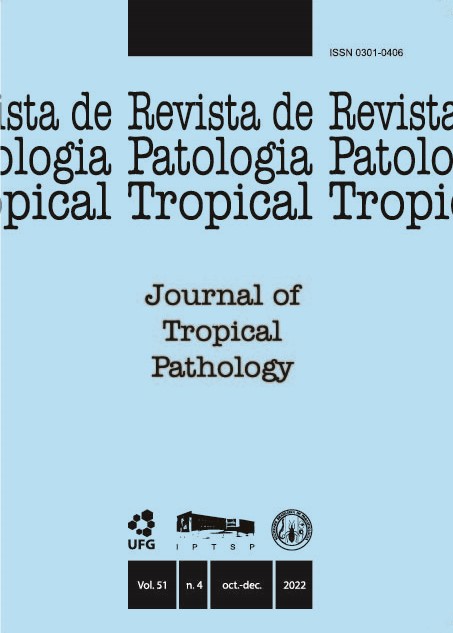Epidemiological profile of hospitalized human metapneumovirus in a capital of central-west of Brazil from 2017 to 2019: high lethality at extremes of age
DOI:
https://doi.org/10.5216/rpt.v51i4.74236Resumo
Human metapneumovirus (hMPV) is a paramyxovirus that causes airway infections. hMPV symptoms range from mild infections of the upper respiratory tract to infections as serious as bronchiolitis and pneumonia. From 2018 to 2019, there was a high incidence of severe acute respiratory syndrome (SARS) in the State of Goiás with a relative increase in hMPV incidence. This study aimed to assess the hMPV epidemiology of cases treated at tertiary hospitals of Goiás, as there are not significant published data from hMPV infection in Brazil. We performed a retrospective and descriptive analysis of a case series of patients infected with hMPV diagnosed by PCR (16 individuals), through medical records review from 2017 to 2019. The observed age distribution was bimodal, with the disease affecting individuals at extremes of age (median of 3.5 years old in the first stratum and median of 52 years in the second stratum). The time between the onset of flu-like symptoms and the first medical assessment had an average of 5 days. The most frequent severe symptoms were respiratory distress/dyspnea and oxygen saturation <95% (93.7% as media), even in patients without comorbidities. The most frequent complications were acute renal failure (18.7%) and healthcare-associated infections (43.7%). Death occurred in 37.5% of patients. hMPV may cause upper and lower respiratory tract infections in patients of all age groups, but the symptomatic disease occurs more frequently at extremes of age. In the pandemic caused by a new coronavirus (SARS-CoV-2), which is known to lead to influenza-like and SARS, the differential diagnosis of the etiologic agent becomes paramount.
KEY WORDS: Respiratory tract infections; paramyxoviridae infections; acute disease.
Downloads
Downloads
Publicado
Como Citar
Edição
Seção
Licença
The manuscript submission must be accompanied by a letter signed by all authors stating their full name and email address, confirming that the manuscript or part of it has not been published or is under consideration for publication elsewhere, and agreeing to transfer copyright in all media and formats for Journal of Tropical Pathology.

